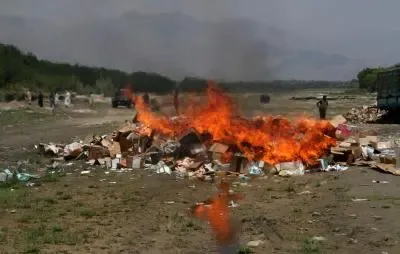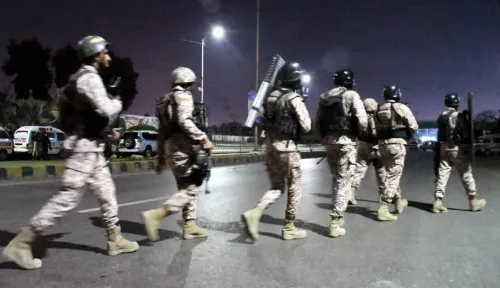How Did Afghan Authorities Dispose of 65 Tonnes of Expired Food?

Synopsis
Key Takeaways
- Afghan authorities destroyed 65 tonnes of expired food items in Kabul.
- Efforts are focused on public health and safety.
- Legal actions will be taken against violators.
- A total of 140 tonnes of expired products have been disposed of since March.
- Similar initiatives have occurred in other Afghan provinces.
Kabul, July 15 (NationPress) Afghan officials have successfully collected and disposed of 65 tonnes of expired and substandard food products in the capital city of Kabul, according to reports from the Ministry of Public Health.
"Today, we eliminated 65 tonnes, which consists of around 11,000 packages of expired and low-quality food items, in the presence of representatives from the Intelligence Directorate and the Kabul municipality," stated Mohammad Massoud Rahimi, a representative from the ministry's food and drug deputy.
Rahimi reaffirmed the deputy's dedication to public health and safety, stating their strong resolve to eradicate such unsafe food items and medications, and emphasized that legal actions will be pursued against those who violate regulations.
Since March 21, the deputy has successfully gathered and destroyed a total of 140 tonnes of expired food and pharmaceutical products in Kabul, as reported by Xinhua news agency.
Previously, authorities in southern Afghanistan's Kandahar and adjacent Zabul province incinerated 10 tonnes of expired food and medications.
During a crackdown in March focused on expired drugs and food items, officials collected three tonnes of outdated products from the provincial capital of Kandahar and surrounding districts, which were publicly burned.
On March 20, the provincial government in Zabul gathered seven tonnes of expired medications and food, which were also publicly incinerated in the provincial capital Qalat.
Authorities have issued warnings that legal actions will ensue for anyone found distributing substandard goods.
This initiative is part of a larger campaign by Afghan authorities aimed at ensuring the safety of food and medicinal products. Similar destruction of outdated drugs and food has occurred in other urban areas, including Kabul, in recent months.
In a separate operation, Afghanistan's counter-narcotics police confiscated 125 kg of methamphetamine during raids in the Helmand province, discovering the illegal substances on the outskirts of the Khanshin district, leading to the arrest of four individuals connected to the case. Their cases have been forwarded to the judiciary for further review and potential legal action.
The interim Afghan government has prohibited poppy cultivation, drug processing, and trafficking in an effort to eradicate the drug issue from the country, which was once a significant producer of poppy.










